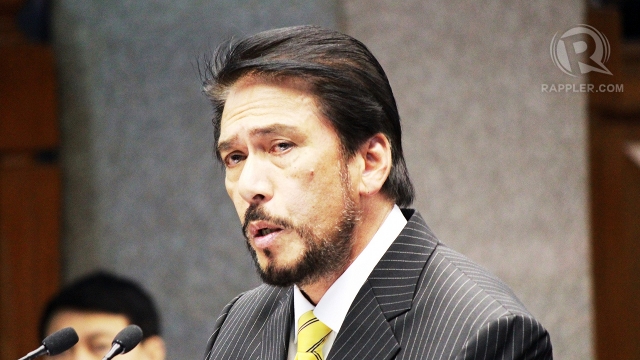SUMMARY
This is AI generated summarization, which may have errors. For context, always refer to the full article.
MANILA, Philippines – He claimed to have been the first cyberbullied senator of the Philippines, and wanted “professional fault-finders” punished.
“Once the Cybercrime Bill is enacted into law, they will be accountable for what they say or write,” Sotto said in an interview, referring to Internet groups that have supposedly launched a black propaganda against him for his opposition to the Reproductive Health bill.
Sotto, like other supposed cyberbullying victims, has gotten his wish.

President Benigno Aquino III has signed the Cybercrime Prevention Act of 2012 or Republic Act 10175, the Palace announced on Saturday, September 15.
The new law doesn’t explicitly ban cyberbullying, but prohibits online libel, a crime that involves defamation as defined by Article 355 or the Revised Penal Code. It also punishes any person “who willfully abets or aids” in committing this offense.
The Revised Penal Code defines libel as the “public and malicious imputation of a crime, or of a vice or defect, real or imaginary, or any act, omission, condition, status, or circumstance tending to cause the dishonor, discredit, or contempt of a natural or juridical person, or to blacken the memory of one who is dead.”
In the past, parties accused of Internet libel have defended themselves by saying no law prohibits this.
Online journalist Edwin Espejo raised this point, among others, in his counter-affidavit to refute the libel suit filed by a friend of Sarangani Rep Manny Pacquiao. “It is a basic principle of criminal law that there is no crime where there is no law,” Espejo’s lawyer said in April.
The Philippine libel law itself, however, has received criticism. Press freedom advocates cite a declaration by the United Nations Human Rights Committee urging the decriminalization of libel.
“The possibility of being arrested and imprisoned even before conviction for libel has been used to silence critical journalists. Former President Gloria Macapagal Arroyo’s husband Jose Miguel Arroyo, for example, filed 11 libel suits against 46 journalists starting in 2006 in an attempt to stop press reporting on and criticism of his wife,” the Freedom Fund for Filipino Journalists explained in a statement.
Cybersex banned, too
Meanwhile, the new Cybercrime Law bans other cybercrimes, such as the following:
-
Cybersex, or “the willful engagement, maintenance, control, or operation, directly or indirectly, of any lascivious exhibition of sexual organs or sexual activity, with the aid of a computer system, for favor or consideration”
-
Child pornography, as defined in the Anti-Child Pornography Act of 2009
-
Illegal access, or “access to the whole or any part of a computer system without right”
-
Identity theft
-
Password theft
-
Cybersquatting, or “the acquisition of a domain name over the internet, in bad faith to profit, mislead, destroy reputation, and deprive others from registering the same, subject to certain conditions
-
Computer-related forgery
Penalties include imprisonment and fines ranging from P50,000 to P1-M, depending on the offense.
(Read the full text of the new law below)
The new law has drawn various reactions from the online community, with arguments involving freedom to criticize politicians, among others. This freedom is crucial as the 2013 election season is about to begin, according to some of them.
Rappler is doing a Twitter conversation on this, which netizens may join using the hashtag #cybercrime. (See Storify link below.)
Add a comment
How does this make you feel?
There are no comments yet. Add your comment to start the conversation.